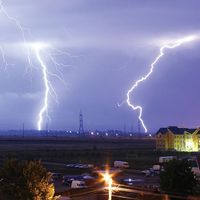In Russia: Motion pictures…world’s first film school, the All-Union Institute of Cinematography in Moscow. Supported by Lenin, who recognized film’s ability to communicate his revolutionary message to illiterate and non-Russian-speaking audiences, the school initially trained filmmakers in the art of agitprop (agitation and propaganda). Like Eisenstein, who incorporated the Marxist dialectic in his…
Read More In history of film: The Soviet UnionThe Vsesoyuznyi Gosudarstvenyi Institut Kinematografii (VGIK; “All-Union State Institute of Cinematography”) was the first such school in the world. Initially it trained people in the production of agitki, existing newsreels reedited for the purpose of agitation and propaganda (agitprop). The agitki were transported on specially equipped…
Read More ","url":"Introduction","wordCount":0,"sequence":1,"headerCarousel":null},"imarsData":{"INFINITE_SCROLL":"","HAS_REVERTED_TIMELINE":"false"},"npsAdditionalContents":{},"templateHandler":{"name":"INDEX"},"paginationInfo":{"previousPage":null,"nextPage":null,"totalPages":1},"uaTemplate":"PHONE","infiniteScrollList":[{"p":1,"t":15952}],"topicLeftRail":{"topicInfo":{"id":15952,"title":"All-Union State Institute of Cinematography","url":"https://www.britannica.com/topic/All-Union-State-Institute-of-Cinematography","description":"Russia: Motion pictures: …world’s first film school, the All-Union Institute of Cinematography in Moscow. Supported by Lenin, who recognized film’s ability to communicate his revolutionary message to illiterate and non-Russian-speaking audiences, the school initially trained filmmakers in the art of agitprop (agitation and propaganda). Like Eisenstein, who incorporated the Marxist dialectic in his…","type":"TOPIC","titleText":"All-Union State Institute of Cinematography","urlTitle":"All-Union-State-Institute-of-Cinematography","metaDescription":"Other articles where All-Union State Institute of Cinematography is discussed: Russia: Motion pictures: …world’s first film school, the All-Union Institute of Cinematography in Moscow. Supported by Lenin, who recognized film’s ability to communicate his revolutionary message to illiterate and non-Russian-speaking audiences, the school initially trained filmmakers in the art of agitprop (agitation and propaganda). Like Eisenstein, who incorporated the Marxist dialectic in his…","alternateTitles":"VGIK, Vsesoyuznyi Gosudarstvenyi Institut Kinematografii","topicClass":"topic","topicKey":"All-Union-State-Institute-of-Cinematography","articleContentType":"INDEX","ppTecType":"THING","gaTemplate":"INDEX","topicType":"INDEX","relativeUrl":"/topic/All-Union-State-Institute-of-Cinematography","assemblyLinkPrefix":"/media/1/15952/"},"topicLink":{"title":"All-Union State Institute of Cinematography","url":"https://www.britannica.com/topic/All-Union-State-Institute-of-Cinematography"},"tocTitle":"Directory","tocEntry":"References","toc":null,"quoteLink":null,"indexLink":null,"factsLink":null,"mediaLink":null,"media":null,"studentLinks":null,"relatedQuizzes":null,"topQuestions":null,"readNext":null,"discover":[{"id":8844,"title":"The Top COVID-19 Vaccine Myths Spreading Online","url":"/list/the-top-covid-19-vaccine-myths-spreading-online","description":"Learn accurate information that disproves COVID-19 vaccine myths.","image":{"id":0,"url":"/06/215106-131-41CC5B68/Magnified-image-coronavirus-clublike-protein-spikes.jpg","altText":"Illustration by the CDC, reveals ultrastructural morphology exhibited by coronaviruses. Note the spikes on the outer surface of the virus, which impart the look of a corona surrounding the virion, when viewed electron microscopically. A novel coronavirus,","credit":"Alissa Eckert, MS and Dan Higgins, MAM/CDC","width":null,"height":null,"fullUrl":"https://cdn.britannica.com/06/215106-131-41CC5B68/Magnified-image-coronavirus-clublike-protein-spikes.jpg"},"type":"LIST","breadcrumb":{"homeLink":null,"items":[{"title":"List","url":"/list/browse"},{"title":"Health & Medicine","url":"/list/browse/Health-Medicine"}],"lastItemTitle":"Health & Medicine"},"superCategory":{"id":6,"title":"Science & Tech","url":"Science-Tech","description":"Explore science and technology; astronomy; biology; chemistry; earth science; mathematics; physics; technology, agriculture, cars, computers, engineering, industry, inventions, communication","keywords":"astronomy; biology; chemistry; earth science; mathematics; physics; technology, agriculture, cars, computers, engineering, industry, inventions, communication","classId":"SCIENCE","sortOrder":2},"hashtags":["COVID-19","SARS-CoV-2","coronavirus","novel coronavirus disease","pandemic","vaccines","variants","facts"],"hashtagsString":"COVID-19, SARS-CoV-2, coronavirus, novel coronavirus disease, pandemic, vaccines, variants, facts","displayDate":[2023,10,9],"urlTitle":"the-top-covid-19-vaccine-myths-spreading-online","featureSubType":"REGULAR","categories":[{"id":3000,"title":"Health & Medicine","url":"Health-Medicine","description":"The study of the human mind and body, how these function, and how they interact—not only with each other but also with their environment—has been of utmost importance in ensuring human well-being. Research on potential treatments and preventive medicine has expanded greatly with the development of modern medicine, and a network of disciplines, including such fields as genetics, psychology, and nutrition, aims to facilitate the betterment of our health.","image":{"id":0,"url":"/07/192107-050-CE043374/anatomy-charts-human-body-muscle-systems-skeletal.jpg","altText":"Health & Medicine","credit":null,"width":null,"height":null,"fullUrl":"https://cdn.britannica.com/07/192107-050-CE043374/anatomy-charts-human-body-muscle-systems-skeletal.jpg"}},{"id":1000,"title":"Science","url":"Science","description":"How can the sky be blue one day and stormy the next? Why do heavy objects tend to fall downwards when dropped? How are birds able to fly (and why can’t I do the same?)? Human beings have long been curious about the world in which we live, striving to identify connections among the phenomenons we witness and to understand how it all works. The field of science has developed over many centuries as a way of studying and understanding the world, beginning with the primitive stage of simply noting important regularities in nature and continuing through the rise of modern science. The modern-day sciences cover a vast range of fields, including biology, chemistry, meteorology, astronomy, physics, and much more.","image":{"id":0,"url":"/86/193986-050-7B2DBB6A/ball-and-stick-model-structure-atoms.jpg","altText":"Science","credit":null,"width":null,"height":null,"fullUrl":"https://cdn.britannica.com/86/193986-050-7B2DBB6A/ball-and-stick-model-structure-atoms.jpg"}},null],"mainCategory":{"id":3000,"title":"Health & Medicine","url":"Health-Medicine","description":"The study of the human mind and body, how these function, and how they interact—not only with each other but also with their environment—has been of utmost importance in ensuring human well-being. Research on potential treatments and preventive medicine has expanded greatly with the development of modern medicine, and a network of disciplines, including such fields as genetics, psychology, and nutrition, aims to facilitate the betterment of our health.","image":{"id":0,"url":"/07/192107-050-CE043374/anatomy-charts-human-body-muscle-systems-skeletal.jpg","altText":"Health & Medicine","credit":null,"width":null,"height":null,"fullUrl":"https://cdn.britannica.com/07/192107-050-CE043374/anatomy-charts-human-body-muscle-systems-skeletal.jpg"}},"typeDisplayName":"List"},{"id":5563,"title":"10 Best Hockey Players of All Time","url":"/list/10-best-hockey-players-of-all-time","description":"Wanna fight about it?","image":{"id":0,"url":"/13/134913-131-D9520745/Ice-Sledge-Hockey-Canada-Cup-USA-ice-2010.jpg","altText":"Ice Sledge Hockey, Hockey Canada Cup, USA (left) vs Canada, 2009. UBC Thunderbird Arena, Vancouver, BC, competition site for Olympic ice hockey and Paralympic ice sledge hockey. Vancouver 2010 Olympic and Paralympic Winter Games, Vancouver Olympics","credit":"© VANOC/COVAN","width":null,"height":null,"fullUrl":"https://cdn.britannica.com/13/134913-131-D9520745/Ice-Sledge-Hockey-Canada-Cup-USA-ice-2010.jpg"},"type":"LIST","breadcrumb":{"homeLink":null,"items":[{"title":"List","url":"/list/browse"},{"title":"Sports & Recreation","url":"/list/browse/Sports-Recreation"}],"lastItemTitle":"Sports & Recreation"},"superCategory":{"id":2,"title":"Arts & Culture","url":"Arts-Culture","description":"Explore arts and culture; entertainment and pop culture, actors, comics, dance, film, food, music, theatre, tv; visual arts, architecture, fashion, painting, photography, sculpture; literature, fiction, nonfiction, plays, poetry, short story; sports and recreation","keywords":"entertainment and pop culture, actors, comics, dance, film, food, music, theatre, tv; visual arts, architecture, fashion, painting, photography, sculpture; literature, fiction, nonfiction, plays, poetry, short story; sports and recreation","classId":"ART","sortOrder":6},"hashtags":["National Hockey League","NHL","ice hockey","Gordie Howe","Wayne Gretzky","Bobby Orr","Mario Lemieux","Maurice Richard","Terry Sawchuk","Jean Béliveau","Jacques Plante","Steve Yzerman","Alex Ovechkin"],"hashtagsString":"National Hockey League, NHL, ice hockey, Gordie Howe, Wayne Gretzky, Bobby Orr, Mario Lemieux, Maurice Richard, Terry Sawchuk, Jean Béliveau, Jacques Plante, Steve Yzerman, Alex Ovechkin","displayDate":[2021,8,5],"urlTitle":"10-best-hockey-players-of-all-time","featureSubType":"REGULAR","categories":[{"id":4000,"title":"Sports & Recreation","url":"Sports-Recreation","description":"Physical contests and recreational games have long played a part in human society. In both team and solo sports, the human body has been pushed to its limits in the name of improving athletic performance and in order to break record upon record. The ancient Olympic Games are an early example of the contests in which humans have engaged to showcase physical prowess. In modern times, sports and games have evolved into a lucrative and competitive industry, while other leisure activities, such as card and video games, can be competitive or just serve as a way to unwind or socialize.","image":{"id":0,"url":"/13/170713-131-8D6B0AF7.jpg","altText":"Sports & Recreation","credit":null,"width":null,"height":null,"fullUrl":"https://cdn.britannica.com/13/170713-131-8D6B0AF7.jpg"}},null,null],"mainCategory":{"id":4000,"title":"Sports & Recreation","url":"Sports-Recreation","description":"Physical contests and recreational games have long played a part in human society. In both team and solo sports, the human body has been pushed to its limits in the name of improving athletic performance and in order to break record upon record. The ancient Olympic Games are an early example of the contests in which humans have engaged to showcase physical prowess. In modern times, sports and games have evolved into a lucrative and competitive industry, while other leisure activities, such as card and video games, can be competitive or just serve as a way to unwind or socialize.","image":{"id":0,"url":"/13/170713-131-8D6B0AF7.jpg","altText":"Sports & Recreation","credit":null,"width":null,"height":null,"fullUrl":"https://cdn.britannica.com/13/170713-131-8D6B0AF7.jpg"}},"typeDisplayName":"List"},{"id":8154,"title":"Does Ball Lightning Exist?","url":"/story/does-ball-lightning-exist","description":"Fantasy, phenomenon, or weapon? How ball lightning has eluded our understanding for centuries.","image":{"id":0,"url":"/75/138875-131-ABCDE003/Lightning-outskirts-thunderstorm-Rom-Oradea-August-17-2005.jpg","altText":"Lightning over the outskirts of Oradea, Rom., during the thunderstorm of August 17, 2005.","credit":"Mircea Madau","width":null,"height":null,"fullUrl":"https://cdn.britannica.com/75/138875-131-ABCDE003/Lightning-outskirts-thunderstorm-Rom-Oradea-August-17-2005.jpg"},"type":"STORY","breadcrumb":{"homeLink":null,"items":[{"title":"Companion","url":"/stories/companion"},{"title":"Science","url":"/stories/companion/Science"}],"lastItemTitle":"Science"},"superCategory":{"id":6,"title":"Science & Tech","url":"Science-Tech","description":"Explore science and technology; astronomy; biology; chemistry; earth science; mathematics; physics; technology, agriculture, cars, computers, engineering, industry, inventions, communication","keywords":"astronomy; biology; chemistry; earth science; mathematics; physics; technology, agriculture, cars, computers, engineering, industry, inventions, communication","classId":"SCIENCE","sortOrder":2},"hashtags":["companion","lightning","ball lightning","plasma","weather","mystery","phenomenon","myth"],"hashtagsString":"companion, lightning, ball lightning, plasma, weather, mystery, phenomenon, myth","displayDate":[2020,8,21],"urlTitle":"does-ball-lightning-exist","featureSubType":"COMPANION","categories":[{"id":1000,"title":"Science","url":"Science","description":"How can the sky be blue one day and stormy the next? Why do heavy objects tend to fall downwards when dropped? How are birds able to fly (and why can’t I do the same?)? Human beings have long been curious about the world in which we live, striving to identify connections among the phenomenons we witness and to understand how it all works. The field of science has developed over many centuries as a way of studying and understanding the world, beginning with the primitive stage of simply noting important regularities in nature and continuing through the rise of modern science. The modern-day sciences cover a vast range of fields, including biology, chemistry, meteorology, astronomy, physics, and much more.","image":{"id":0,"url":"/86/193986-050-7B2DBB6A/ball-and-stick-model-structure-atoms.jpg","altText":"Science","credit":null,"width":null,"height":null,"fullUrl":"https://cdn.britannica.com/86/193986-050-7B2DBB6A/ball-and-stick-model-structure-atoms.jpg"}},null,null],"mainCategory":{"id":1000,"title":"Science","url":"Science","description":"How can the sky be blue one day and stormy the next? Why do heavy objects tend to fall downwards when dropped? How are birds able to fly (and why can’t I do the same?)? Human beings have long been curious about the world in which we live, striving to identify connections among the phenomenons we witness and to understand how it all works. The field of science has developed over many centuries as a way of studying and understanding the world, beginning with the primitive stage of simply noting important regularities in nature and continuing through the rise of modern science. The modern-day sciences cover a vast range of fields, including biology, chemistry, meteorology, astronomy, physics, and much more.","image":{"id":0,"url":"/86/193986-050-7B2DBB6A/ball-and-stick-model-structure-atoms.jpg","altText":"Science","credit":null,"width":null,"height":null,"fullUrl":"https://cdn.britannica.com/86/193986-050-7B2DBB6A/ball-and-stick-model-structure-atoms.jpg"}},"typeDisplayName":"Companion"},{"id":6434,"title":"9 American Political Scandals","url":"/list/9-american-political-scandals","description":"Are you ready to be scandalized?","image":{"id":0,"url":"/64/164764-131-89DFC4D4/Richard-M-Nixon-scandal-press-conference-March-12-1971.jpg","altText":"Watergate scandal. Richard M. Nixon. President Nixon gives a press conference and talks to the press, March 12, 1971.","credit":"Oliver F. Atkins—White House Photo/Nixon Presidential Library and Museum/NARA","width":null,"height":null,"fullUrl":"https://cdn.britannica.com/64/164764-131-89DFC4D4/Richard-M-Nixon-scandal-press-conference-March-12-1971.jpg"},"type":"LIST","breadcrumb":{"homeLink":null,"items":[{"title":"List","url":"/list/browse"},{"title":"Politics, Law & Government","url":"/list/browse/Politics-Law-Government"}],"lastItemTitle":"Politics, Law & Government"},"superCategory":{"id":5,"title":"History & Society","url":"History-Society","description":"Explore history and society; accidents and disasters; the age of revolutions; the ancient world; historic dynasties; global exploration; the middle ages; the modern world; prehistory; US history; world history; wars and battles; sociology; religion and philosophy; humanities; ethics; anthropology; festivals and holidays; human rights; human migration; international relations; politics, law, and government","keywords":"accidents and disasters; the age of revolutions; the ancient world; historic dynasties; global exploration; the middle ages; the modern world; prehistory; US history; world history; wars and battles; sociology; religion and philosophy; humanities; ethics; anthropology; festivals and holidays; human rights; human migration; international relations; politics, law, and government","classId":"HISTORY","sortOrder":1},"hashtags":["political scandals","Watergate scandal","Iran-Contra Affair","Whiskey Ring Scandal","Crédit Mobilier Scandal","Teapot Dome Scandal","Chappaquiddick","Bill Clinton","Monica Lewinsky","impeachment","Grover Cleveland","Andrew Jackson","bigamy","Ted Kennedy","Mary Jo Kopechne","American history","U.S. history","U.S. presidency","U.S. government "],"hashtagsString":"political scandals, Watergate scandal, Iran-Contra Affair, Whiskey Ring Scandal, Crédit Mobilier Scandal, Teapot Dome Scandal, Chappaquiddick, Bill Clinton, Monica Lewinsky, impeachment, Grover Cleveland, Andrew Jackson, bigamy, Ted Kennedy, Mary Jo Kopechne, American history, U.S. history, U.S. presidency, U.S. government ","displayDate":[2018,3,14],"urlTitle":"9-american-political-scandals","featureSubType":"REGULAR","categories":[{"id":9000,"title":"Politics, Law & Government","url":"Politics-Law-Government","description":"The world today is divided territorially into more than 190 countries, each of which possesses a national government that claims to exercise sovereignty and seeks to compel obedience to its will by its citizens. Governments can be classified in any number of ways. For example, they might be classified by the number of rulers, thus distinguishing government by one (as in a monarchy or a tyranny) from government by the few (in an aristocracy or oligarchy) and from government by the many (as in a democracy). Governments can also be classified by mode of succession; for example, ascension to governmental leadership may follow the rules of hereditary succession, or it may be determined through elections or by force. Governments also vary in terms of the laws and rules of conduct that each political entity follows.","image":{"id":0,"url":"/22/99622-050-E70BCD0A/Parthenon-Athens.jpg","altText":"Politics, Law & Government","credit":null,"width":null,"height":null,"fullUrl":"https://cdn.britannica.com/22/99622-050-E70BCD0A/Parthenon-Athens.jpg"}},{"id":6000,"title":"World History","url":"World-History","description":"Does history really repeat itself, or can we learn from the mistakes of those who came before us? History provides a chronological, statistical, and cultural record of the events, people, and movements that have made an impact on humankind and the world at large throughout the ages.","image":{"id":0,"url":"/05/84505-050-8BB58BE6/cave-art-Ennedi-Plateau-Chad.jpg","altText":"World History","credit":null,"width":null,"height":null,"fullUrl":"https://cdn.britannica.com/05/84505-050-8BB58BE6/cave-art-Ennedi-Plateau-Chad.jpg"}},null],"mainCategory":{"id":9000,"title":"Politics, Law & Government","url":"Politics-Law-Government","description":"The world today is divided territorially into more than 190 countries, each of which possesses a national government that claims to exercise sovereignty and seeks to compel obedience to its will by its citizens. Governments can be classified in any number of ways. For example, they might be classified by the number of rulers, thus distinguishing government by one (as in a monarchy or a tyranny) from government by the few (in an aristocracy or oligarchy) and from government by the many (as in a democracy). Governments can also be classified by mode of succession; for example, ascension to governmental leadership may follow the rules of hereditary succession, or it may be determined through elections or by force. Governments also vary in terms of the laws and rules of conduct that each political entity follows.","image":{"id":0,"url":"/22/99622-050-E70BCD0A/Parthenon-Athens.jpg","altText":"Politics, Law & Government","credit":null,"width":null,"height":null,"fullUrl":"https://cdn.britannica.com/22/99622-050-E70BCD0A/Parthenon-Athens.jpg"}},"typeDisplayName":"List"},{"id":6199,"title":"Do Lemmings Really Commit Mass Suicide?","url":"/story/do-lemmings-really-commit-mass-suicide","description":"Is it true that groups of lemmings jump off seaside cliffs to their deaths?","image":{"id":0,"url":"/44/195044-131-92574FF7/Lemmings-Really-Commit-Mass-Suicide-illustration.jpg","altText":"Demystified - Do Lemmings Really Commit Mass Suicide? illustration","credit":"Encyclopædia Britannica, Inc./Patrick O'Neill Riley","width":null,"height":null,"fullUrl":"https://cdn.britannica.com/44/195044-131-92574FF7/Lemmings-Really-Commit-Mass-Suicide-illustration.jpg"},"type":"STORY","breadcrumb":{"homeLink":null,"items":[{"title":"Demystified","url":"/stories/demystified"},{"title":"Science","url":"/stories/demystified/Science"}],"lastItemTitle":"Science"},"superCategory":{"id":6,"title":"Science & Tech","url":"Science-Tech","description":"Explore science and technology; astronomy; biology; chemistry; earth science; mathematics; physics; technology, agriculture, cars, computers, engineering, industry, inventions, communication","keywords":"astronomy; biology; chemistry; earth science; mathematics; physics; technology, agriculture, cars, computers, engineering, industry, inventions, communication","classId":"SCIENCE","sortOrder":2},"hashtags":["demystified","lemmings","animals","suicide","myth","cliffs"],"hashtagsString":"demystified, lemmings, animals, suicide, myth, cliffs","displayDate":[2017,4,26],"urlTitle":"do-lemmings-really-commit-mass-suicide","featureSubType":"DEMYSTIFIED","categories":[{"id":1000,"title":"Science","url":"Science","description":"How can the sky be blue one day and stormy the next? Why do heavy objects tend to fall downwards when dropped? How are birds able to fly (and why can’t I do the same?)? Human beings have long been curious about the world in which we live, striving to identify connections among the phenomenons we witness and to understand how it all works. The field of science has developed over many centuries as a way of studying and understanding the world, beginning with the primitive stage of simply noting important regularities in nature and continuing through the rise of modern science. The modern-day sciences cover a vast range of fields, including biology, chemistry, meteorology, astronomy, physics, and much more.","image":{"id":0,"url":"/86/193986-050-7B2DBB6A/ball-and-stick-model-structure-atoms.jpg","altText":"Science","credit":null,"width":null,"height":null,"fullUrl":"https://cdn.britannica.com/86/193986-050-7B2DBB6A/ball-and-stick-model-structure-atoms.jpg"}},null,null],"mainCategory":{"id":1000,"title":"Science","url":"Science","description":"How can the sky be blue one day and stormy the next? Why do heavy objects tend to fall downwards when dropped? How are birds able to fly (and why can’t I do the same?)? Human beings have long been curious about the world in which we live, striving to identify connections among the phenomenons we witness and to understand how it all works. The field of science has developed over many centuries as a way of studying and understanding the world, beginning with the primitive stage of simply noting important regularities in nature and continuing through the rise of modern science. The modern-day sciences cover a vast range of fields, including biology, chemistry, meteorology, astronomy, physics, and much more.","image":{"id":0,"url":"/86/193986-050-7B2DBB6A/ball-and-stick-model-structure-atoms.jpg","altText":"Science","credit":null,"width":null,"height":null,"fullUrl":"https://cdn.britannica.com/86/193986-050-7B2DBB6A/ball-and-stick-model-structure-atoms.jpg"}},"typeDisplayName":"Demystified"},{"id":10704,"title":"Estimated Battle Casualties During the Normandy Invasion on June 6, 1944","url":"/story/estimated-battle-casualties-during-the-normandy-invasion-on-june-6-1944","description":"The exact number of casualties suffered in the Normandy Invasion and subsequent campaign that liberated Paris during World War II will never be known. The figures given in this graph were selected from official histories or provided by advisers as generally agreed upon estimates. They are presented mainly for purposes of comparison and to give a sense of the scale of the human losses.","image":{"id":0,"url":"/91/257891-050-9F103448/normandy-invasion-estimated-battle-casualties-dday.jpg","altText":"Estimated battle casualties, Normandy invasion, World War II. WWII, D-Day","credit":"Encyclopædia Britannica, Inc.","width":null,"height":null,"fullUrl":"https://cdn.britannica.com/91/257891-050-9F103448/normandy-invasion-estimated-battle-casualties-dday.jpg"},"type":"STORY","recentlyPublished":true,"breadcrumb":{"homeLink":null,"items":[{"title":"Spotlight","url":"/stories/spotlight"},{"title":"World History","url":"/stories/spotlight/World-History"}],"lastItemTitle":"World History"},"superCategory":{"id":5,"title":"History & Society","url":"History-Society","description":"Explore history and society; accidents and disasters; the age of revolutions; the ancient world; historic dynasties; global exploration; the middle ages; the modern world; prehistory; US history; world history; wars and battles; sociology; religion and philosophy; humanities; ethics; anthropology; festivals and holidays; human rights; human migration; international relations; politics, law, and government","keywords":"accidents and disasters; the age of revolutions; the ancient world; historic dynasties; global exploration; the middle ages; the modern world; prehistory; US history; world history; wars and battles; sociology; religion and philosophy; humanities; ethics; anthropology; festivals and holidays; human rights; human migration; international relations; politics, law, and government","classId":"HISTORY","sortOrder":1},"hashtags":["spotlight","WWII","World War II","Normandy","Normandy Invasion","Normandy campaign","D-Day","deaths","casualties","soldiers","United States","United Kingdom","Canada","Germany","France","graph","infographic"],"hashtagsString":"spotlight, WWII, World War II, Normandy, Normandy Invasion, Normandy campaign, D-Day, deaths, casualties, soldiers, United States, United Kingdom, Canada, Germany, France, graph, infographic","displayDate":[2024,6,7],"urlTitle":"estimated-battle-casualties-during-the-normandy-invasion-on-june-6-1944","featureSubType":"SPOTLIGHT","categories":[{"id":6000,"title":"World History","url":"World-History","description":"Does history really repeat itself, or can we learn from the mistakes of those who came before us? History provides a chronological, statistical, and cultural record of the events, people, and movements that have made an impact on humankind and the world at large throughout the ages.","image":{"id":0,"url":"/05/84505-050-8BB58BE6/cave-art-Ennedi-Plateau-Chad.jpg","altText":"World History","credit":null,"width":null,"height":null,"fullUrl":"https://cdn.britannica.com/05/84505-050-8BB58BE6/cave-art-Ennedi-Plateau-Chad.jpg"}},null,null],"mainCategory":{"id":6000,"title":"World History","url":"World-History","description":"Does history really repeat itself, or can we learn from the mistakes of those who came before us? History provides a chronological, statistical, and cultural record of the events, people, and movements that have made an impact on humankind and the world at large throughout the ages.","image":{"id":0,"url":"/05/84505-050-8BB58BE6/cave-art-Ennedi-Plateau-Chad.jpg","altText":"World History","credit":null,"width":null,"height":null,"fullUrl":"https://cdn.britannica.com/05/84505-050-8BB58BE6/cave-art-Ennedi-Plateau-Chad.jpg"}},"typeDisplayName":"Spotlight"},{"id":6159,"title":"7 Deadliest Weapons in History","url":"/list/7-deadliest-weapons-in-history","description":"From rocks to rockets.","image":{"id":0,"url":"/28/60728-131-36BD65EF/infantrymen-German-Maxim-World-War-I-machine.jpg","altText":"Figure 13: A Maxim machine gun, belt-fed and water-cooled, operated by German infantrymen, World War I.","credit":"Imperial War Museum","width":null,"height":null,"fullUrl":"https://cdn.britannica.com/28/60728-131-36BD65EF/infantrymen-German-Maxim-World-War-I-machine.jpg"},"type":"LIST","breadcrumb":{"homeLink":null,"items":[{"title":"List","url":"/list/browse"},{"title":"Technology","url":"/list/browse/Technology"}],"lastItemTitle":"Technology"},"superCategory":{"id":6,"title":"Science & Tech","url":"Science-Tech","description":"Explore science and technology; astronomy; biology; chemistry; earth science; mathematics; physics; technology, agriculture, cars, computers, engineering, industry, inventions, communication","keywords":"astronomy; biology; chemistry; earth science; mathematics; physics; technology, agriculture, cars, computers, engineering, industry, inventions, communication","classId":"SCIENCE","sortOrder":2},"hashtags":["deadliest weapons","swords","drones","nuclear weapons","wmd","machine gun","Greek fire","weapons","killing","destruction"],"hashtagsString":"deadliest weapons, swords, drones, nuclear weapons, wmd, machine gun, Greek fire, weapons, killing, destruction","displayDate":[2017,3,24],"urlTitle":"7-deadliest-weapons-in-history","featureSubType":"REGULAR","categories":[{"id":2000,"title":"Technology","url":"Technology","description":"Humankind has long striven to improve its living conditions through the development of tools, instruments, and transportation and communications systems, all with the goal of making our lives easier, more productive and—why not?—more fun, too. Thanks to human curiosity and technological research, many significant inventions have been made throughout history that in turn made a difference in our daily lives.","image":{"id":0,"url":"/84/203584-131-357FBE7D/speed-internet-technology-background.jpg","altText":"Technology","credit":null,"width":null,"height":null,"fullUrl":"https://cdn.britannica.com/84/203584-131-357FBE7D/speed-internet-technology-background.jpg"}},{"id":6000,"title":"World History","url":"World-History","description":"Does history really repeat itself, or can we learn from the mistakes of those who came before us? History provides a chronological, statistical, and cultural record of the events, people, and movements that have made an impact on humankind and the world at large throughout the ages.","image":{"id":0,"url":"/05/84505-050-8BB58BE6/cave-art-Ennedi-Plateau-Chad.jpg","altText":"World History","credit":null,"width":null,"height":null,"fullUrl":"https://cdn.britannica.com/05/84505-050-8BB58BE6/cave-art-Ennedi-Plateau-Chad.jpg"}},null],"mainCategory":{"id":2000,"title":"Technology","url":"Technology","description":"Humankind has long striven to improve its living conditions through the development of tools, instruments, and transportation and communications systems, all with the goal of making our lives easier, more productive and—why not?—more fun, too. Thanks to human curiosity and technological research, many significant inventions have been made throughout history that in turn made a difference in our daily lives.","image":{"id":0,"url":"/84/203584-131-357FBE7D/speed-internet-technology-background.jpg","altText":"Technology","credit":null,"width":null,"height":null,"fullUrl":"https://cdn.britannica.com/84/203584-131-357FBE7D/speed-internet-technology-background.jpg"}},"typeDisplayName":"List"}]},"byline":null,"citationInfo":null,"websites":null,"freeTopicReason":"TOPIC_IS_INDEX_PAGE","articleSchemaMarkup":{"keywords":"All-Union State Institute of Cinematography","wordcount":0,"url":"https://www.britannica.com/topic/All-Union-State-Institute-of-Cinematography","description":"Other articles where All-Union State Institute of Cinematography is discussed: Russia: Motion pictures: …world’s first film school, the All-Union Institute of Cinematography in Moscow. Supported by Lenin, who recognized film’s ability to communicate his revolutionary message to illiterate and non-Russian-speaking audiences, the school initially trained filmmakers in the art of agitprop (agitation and propaganda). Like Eisenstein, who incorporated the Marxist dialectic in his…","publisher":{"name":"Encyclopedia Britannica","@type":"Organization","logo":{"url":"https://corporate.britannica.com/wp-content/themes/eb-corporate/_img/logo.png","@type":"ImageObject"}},"@context":"https://schema.org","@type":"article"},"studentArticle":false,"initialLoad":true}
Learn about this topic in these articles:
role in Soviet cinema
- In Russia: Motion pictures
…world’s first film school, the All-Union Institute of Cinematography in Moscow. Supported by Lenin, who recognized film’s ability to communicate his revolutionary message to illiterate and non-Russian-speaking audiences, the school initially trained filmmakers in the art of agitprop (agitation and propaganda). Like Eisenstein, who incorporated the Marxist dialectic in his…
Read More - In history of film: The Soviet Union
The Vsesoyuznyi Gosudarstvenyi Institut Kinematografii (VGIK; “All-Union State Institute of Cinematography”) was the first such school in the world. Initially it trained people in the production of agitki, existing newsreels reedited for the purpose of agitation and propaganda (agitprop). The agitki were transported on specially equipped…
Read More










